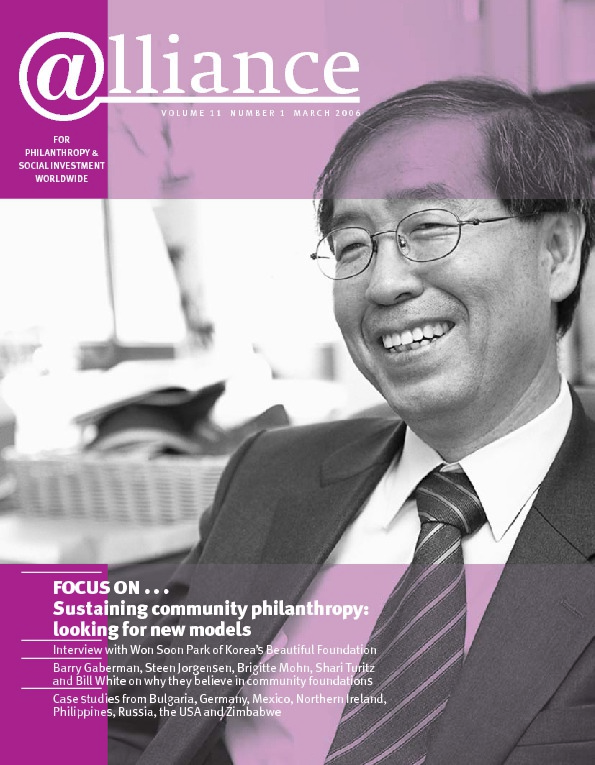This book is an interesting read, well organized, and, as the subtitle promises, full of lessons. It considers the role of philanthropy and its promotion, and then goes on to discuss questions such as effective boards, programme design, and evaluation. It also has a chapter on theories of social change, and one on INSP’s own theory of change tool.
In the first chapter, ‘The Role of Philanthropy in Globalization’, the authors illustrate through case studies where and how foundations can become strategic philanthropic institutions at the global level. It shows how some of the best-known foundations identify the needs they want to address, how they develop a strategic approach to them, and what strategies/mechanisms prove effective for operating globally.
As a foundation professional, the chapters I found most useful were: ‘Promoting Philanthropy: Global challenges and approaches’; ‘Effective Foundation Boards – The importance of roles’; ‘Philanthropy Program Design’; ‘The Role of Evaluation in the 21st Century Foundation’; ‘Who Comes to the Table? Stakeholder interactions in philanthropy’; ‘Management Practices Surrounding Program Professionals in US and European Foundations’; and ‘Innovations in Strategic Philanthropy – Lessons from Africa, Asia, Central and Eastern Europe, and Latin America’.
The chapter on promoting philanthropy is very instructive. It looks at the challenges of promoting philanthropy, from the legal and financial environment to culture, capacity and infrastructure; the key audiences; and strategies for promoting philanthropy, including legal reform, public awareness campaigns, donor leadership, professional advisers, and place-based, peer-based and issue-based philanthropy. In view of the fact that global philanthropy is tiny compared to global wealth, the chapter ends with several proposals for moving forward.
I agree with the authors of the chapter on foundation boards that many of the problems experienced by boards could be solved if there were more clarity about the roles they can play. While I believe that the cultural context is very important, the arguments resonated with me, especially the discussion on achieving clarity, influence and accountability. The authors conclude that ‘The nature of philanthropy – generosity – and the flexibility that is a feature of foundation structure demand that we consider as legitimate many more roles than are typically considered in the literature.’
The idea of strategic grantmaking in the chapter on programme design is a very important one, especially for developing countries. Foundations and philanthropists often underestimate the potential of their resources as a ‘lever for change’, and a programme’s design is key to whether resources act as such a lever or not. The chapter provides a step-by-step discussion of the process of programme design, illustrated by several case studies.
The chapter on evaluation follows this, a logical next step. Its most interesting feature is the discussion of the pitfalls of evaluation and how to avoid them. The insights on excessive focus on specifying outcomes and premature evaluation of innovations are eye-opening.
I was also glad that the authors devoted a whole chapter to stakeholders. My own experience has taught me their importance in the success or failure of an initiative. The authors discuss who stakeholders are, why their interactions are important, what modes of interaction bring stakeholders together, and how these interactions can be improved. Again, the lessons are illustrated through case studies.
While the importance of sound management practices and leadership skills among programme professionals is universal, the lessons in the management practices chapter did not resonate with me. However, I found the continuum on the creative tensions and challenges in the role of programme professionals worth reflecting on.
The chapter on innovations is the only one that really focuses on the experiences of the developing world – Africa, Asia, Central and Eastern Europe, and Latin America – and it showed that while most of the lessons in the book come from North America and Europe, there is much to learn from the experiences of the ‘other world’.
The book provides research- and experience-based insights, not easy answers. Some of its content will be immediately useful in my work, and I foresee that I will keep going back to it to reflect on certain concepts, ideas and insights.
Marissa Camacho-Reyes is Executive Director of the Jollibee Foundation and Chairperson, Community Foundations Committee, Association of Foundations (Philippines). She can be contacted at marissa.camacho@jollibee.com.ph
Rethinking Philanthropic Effectiveness: Lessons from an international network of foundation experts
Dirk Eilinghoff (ed) International Network on Strategic Philanthropy (INSP)
€24 (€30 for non-EU residents)
To order, visit http://www.insp.efc.be or contact INSP at insp@bertelsmann.de
For readers outside the EU, visit http://www.brookings.edu






Comments (0)